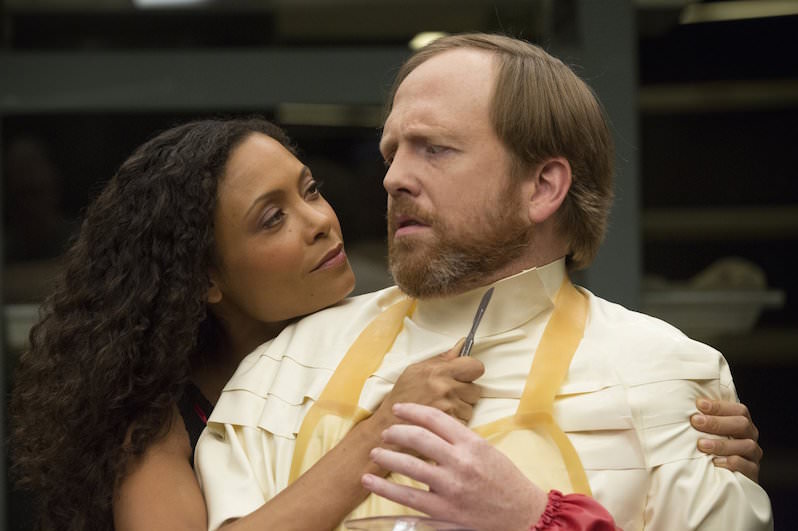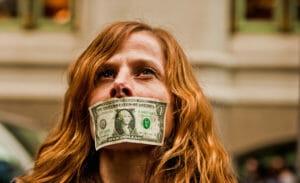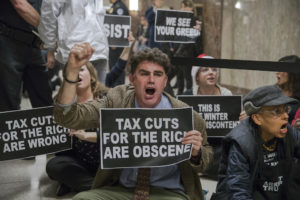Killer Robots and Rebel Wieners: Did Hollywood’s Working-Class Revolt Fantasies Fuel Trump’s Rise?
Class-war fantasies are a hot new genre on the big and small screen. They might be amping up Donald Trump-mania.
Have scalpel, will rebel: As “Westworld’s” sexbot-turned-agitator Maeve, Thandie Newton takes IT troubleshooting into her own hands at the expense of Ptolemy Slocum’s Sylvester. (IMDb)
the obscene and surreal animated film written by stoner heroes Evan Goldberg and Seth Rogen, was a surprisingly big hit this summer, out-earning bigger-budget, more family friendly animated movies like Disney’s “Pete’s Dragon” (which was released on the same day) at both the box office and on DVD and Blu-Ray. While most critics and reviewers attributed its success to its high laugh count and deft voice acting by Rogen, Kristen Wiig, and other comedy luminaries, some also noted that it had what The New Republic’s Will Leitch called an “atheist plotline,” lending the film a “’serious’ patina” and adding poignancy to the film’s punch. While this is certainly true, Leitch and many other critics seem to have overlooked the film’s even deeper, more disturbing, theme: It also serves as a violent parable for class warfare—one that bears eerie similarities to the rhetoric that, 2½ months later, would help Donald Trump win the presidential election.
Full disclosure: I’m a media studies professor, and it’s my business to look for hidden meanings with political implications lurking just beneath the surface of popular culture. It’s something people in my field have been doing at least since the early days of mass media, when cultural critics like Theodor Adorno and Walter Benjamin claimed to see the grains of fascism and socialism in a popular jazz song or a postcard from a museum gift shop. But before you dismiss that line of thought as a bunch of academic hooey, consider how often certain narratives seem to dominate Hollywood for a while, eventually disappearing and being replaced by new trends and genres. And think about how often those narratives seem to not only reflect, but to anticipate, major social and political changes.
Many of Hollywood’s biggest narratives have something to do with wealth and class relations—which makes sense, given that American culture’s dominant theme is social mobility and the transformative power of money. During the Cold War, when America was at its wealthiest and the middle class was at its largest and most powerful, Hollywood churned out movie after movie about bourgeois angst and the search for authenticity in a world of bland consumerism. From “Rebel Without a Cause” to “The Graduate” to “Something Wild” to “The Ice Storm,” decades of movies and television shows chronicled the pain and suffering of those poor souls whose material comfort and financial security insulated them from the “real world” and celebrated characters who were able to transcend the decadence of their cosseted lives.
In the 1990s, as a new, post-Cold War era of globalization and “free trade” took shape, American workers began to feel increasingly threatened by foreign labor, and Hollywood’s dominant narratives began to change as well. There were still plenty of stories about disaffected members of the bourgeoisie searching for something real, but many of the new hit television shows centered around a different kind of narrative altogether: competition for scarce resources. Over the next two decades, the “reality” format offered hundreds of variations on the same theme, in which a large pool of aspirants would be winnowed down over the course of a season, with one emerging victorious thanks to a potent combination of innate talent, devious gamesmanship, televisual charisma and sheer grit.
Some of these shows, like Donald Trump’s long-running NBC hit “The Apprentice” and ABC’s “Shark Tank,” are explicitly about entrepreneurialism and the search for financial security among workers in the so-called “new economy.” These shows offer one lucky winner the opportunity to get a corporate job or to obtain investment funding, while the rest of the contestants presumably return to a life of instability and hustling. Other shows, such as Fox’s “American Idol,” HBO’s “Project Greenlight” and Lifetime’s “Project Runway” offer a similar narrative, but one geared toward creative professionals. Not everyone can be a singer, filmmaker or fashion designer, these shows tell us, but if someone dreams big enough, works hard enough, and has “what it takes,” maybe—just maybe—they’ll make it to the big leagues. Finally, there are shows in which people aren’t just competing for jobs, they’re competing for access to the security, stability and intimacy that (theoretically) come with marriage. The exemplar of this subgenre is ABC’s “The Bachelor,” which just completed its 20th season, and has spawned any number of spinoffs.
These shows aren’t merely mindless entertainment; to a growing number of people driving Ubers, renting out their bedrooms via Airbnb or living with their parents or college roommates well into adulthood, the reality competition format offers a glimpse of hope for a better life. If Stefanie Shaeffer can get hired by Donald Trump, or Ben and Lauren can find true love, these narratives suggest, you can improve your own life by learning from their successes as well as from the mistakes of the losers they vanquished.The reality competition format is still going strong, but it’s gotten fairly stale, and a number of high-profile reality shows have recently seen their ratings slump or have even been canceled. (“Duck Dynasty” is the most recent casualty.) While this may be attributed to the notoriously fickle tastes of American consumers, it may also be due to the ascendance of a new Hollywood trope: the working-class revenge fantasy.
There are numerous examples of this popular new theme in both film and television over the past few years. Perhaps its most literal expression is in USA’s sleeper hit “Mr. Robot,” which earned both critical and popular success during its first season in 2015, resulting in an Emmy for its star Rami Malek—the first person of color in 18 years to win for best actor in a drama. The show features a bunch of hackers with working-class roots exacting revenge against an amoral corporation and its immoral executives for both personal and social injustices. One scene in the second season shows the hacker daughter of a toxic waste-sickened cancer victim remorselessly killing a corporate lawyer with a stun gun in her own wave pool. Yet, despite the show’s explicit reliance on Occupy Wall Street’s class-war rhetoric and Anonymous’ hacktivist tactics, it ultimately steps back from advocating out-and-out class warfare, depicting the hacker heroes as well-intentioned but clueless dupes of a manipulative foreign power.
A more typical mainstream example of the blockbuster working-class revenge fantasy is the “Hunger Games” franchise. As practically everyone on the planet knows, this story revolves around the adventures of a coal miner’s daughter whose hunting skills and incorruptible spirit make her the unlikely avatar of a resistance movement against a dystopian, futuristic, post-apocalyptic, authoritarian regime. Although the franchise clung tightly to its fig leaf of futurism, even its teenaged target audience understood it to be a parable for our era of growing income inequality, and a potent warning that the economic and political elites will ultimately be held accountable, at the business end of a projectile weapon, if they don’t direct wealth and power back into the hands of America’s working poor. This parable even became explicitly political in Thailand, where the three-fingered salute from the story’s resistance movement depicted in the big-screen series was adopted by protesters against the 2014 military coup backed by social elites. Yet, like “Mr. Robot,” and unlike the Thai resistance movement, the “Hunger Games” narrative itself ultimately steps back from the precipice, showing the would-be revolutionaries to be just as corrupt and untrustworthy as the elites they seek to supplant.
Another, less obvious, example of the working-class revenge fantasy gussied up as futuristic parable is HBO’s “Westworld,” which is about to complete its first season. In the show, semiconscious androids in an Old West theme park serve as foils and “fuck dolls” for wealthy tourists embarking on quests for adventure and self-knowledge (in a way that eerily evokes the heroes of those Cold War-era narratives discussed above). When some of these androids become fully conscious due to a software update, they skip out of their narrative “loops” and seek liberation. In last week’s episode, a conscious android named Maeve, who has been subject to countless acts of violence since she was reassigned from the role of homestead mother to that of brothel madame, begins to take her revenge on the theme park’s operators. Realizing they are not the “gods” she initially took them to be, she wields a scalpel and slices one’s throat, threatening his coworker with the same treatment if he doesn’t help her escape.
Two things make this narrative more compelling and immediate than either “Mr. Robot” or “The Hunger Games.” First of all, Maeve’s rage isn’t against a political state that undervalues her role as a citizen or reduces her to the status of a mere consumer. Instead, she recognizes that she was dreaming when she believed herself to be either. All she is, and ever has been, is a commodity, bought and sold by a class of economic and technical elites who are blinded by the hubris of their own privilege to her subjectivity, her inner life. Second, when Maeve resorts to violence to win her freedom, she doesn’t do so numbly, as does “Mr. Robot’s” Darlene, or ambivalently, as does Katniss in “The Hunger Games.” Maeve’s violence is deliberate and unapologetic, without a shred of doubt or remorse. As played by Thandie Newton, she even flashes a trace of a triumphant smile as she watches her captor bleed.
All of which brings us back to “Sausage Party,” which has a lot more in common with “Westworld” than most viewers would probably think. While the characters in “Westworld” are commodities who look like people, and believe themselves to be living authentic lives, the ones in “Sausage Party” are just plain commodities. More specifically, they are literally a bunch of groceries—hot dogs, buns, jars of mustard, and so forth. Like the androids in “Westworld,” they initially believe their human captors to be “gods,” yet instead of dreaming of a better, more blessed life, they merely dream of a better afterlife, in which their purchasers lavish them with love and affection (Marxists would call this “commodity fetishism”). At no point does the concept of autonomy ever occur to them.The plot of “Sausage Party” centers around a hot dog named Frank, who discovers the truth of the commodity afterlife: The groceries are used or eaten by their purchasers, and the remains are unceremoniously thrown away. At one point, in perhaps the most unlikely metaphor for class privilege in the history of cinema, a human tripping on bath salts recognizes the true sentience of his groceries and is horrified by the implications, but he forgets as soon as he sobers up. The plot takes a turn once the groceries discover that this “god” is actually a mortal, when another hot dog brings his decapitated head back to the store for the rest to marvel at. The groceries hatch a plan to inject bath salts into all the shoppers and workers at the store, forcing them to confront the violence of their consumerist lifestyle. Yet, instead of seeking amicable and equal relations with these newly awoken human elites, the groceries slaughter them all and then hold a massive orgy.
During the 2016 election cycle, working-class angst and anger was a widely recognized and frequently discussed phenomenon, but it was misunderstood as something that could be acknowledged, pandered to and ultimately accommodated by political elites. Stories like “Mr. Robot” and “The Hunger Games,” produced in the early phase of this cycle, gave voice to this anger but did so in a way that was calculated to be both cathartic and didactic, demonstrating the shortcomings of violent insurrection and offering the ham-fisted conclusion that oppressive systems may be most effectively changed from within. These are the kind of media-enabled narratives that contributed to, and drew from, the meteoric rise of left-wing populists, especially Bernie Sanders, during the primary phase of the political process.
Political pundits may be excused for seeing the success of these stories and coming to the conclusion that, once Bernie Sanders had been effectively sidelined and absorbed by the Democratic National Committee, a significant portion of working-class voters would rally around Democratic presidential nominee Hillary Clinton as their champion. In fact, from the date of “Sausage Party’s” August box-office release until the election, political forecast guru Nate Silver never once gave Trump a better chance of winning than Clinton.
Yet, if the pundits had kept a more careful watch on the shifting tones of popular culture, it’s possible they would have detected a telling change in the working-class revenge fantasy narrative from 2015 to 2016. As the heroes of the stories shifted from dispossessed citizens to pissed off commodities, as the solution to social inequity shifted from structural change to structural demolition, and as the representation of violence morphed from necessary evil to gleeful comeuppance, a new political narrative shaped by unrelenting economic hardship was weaving itself into American consciousness—one that would rally millions of working-class voters to Trump’s side and deliver him the presidency.
Whether the promise of destruction and violence that played out in these stories will be fulfilled off-screen is still an open question, but signs are pointing in a scary direction for anyone with something to lose. What happens next is far from certain, but we should probably start paying closer attention to what’s resonating with television and movie audiences if we want to be ready.
Independent journalism is under threat and overshadowed by heavily funded mainstream media.
You can help level the playing field. Become a member.
Your tax-deductible contribution keeps us digging beneath the headlines to give you thought-provoking, investigative reporting and analysis that unearths what's really happening- without compromise.
Give today to support our courageous, independent journalists.






You need to be a supporter to comment.
There are currently no responses to this article.
Be the first to respond.